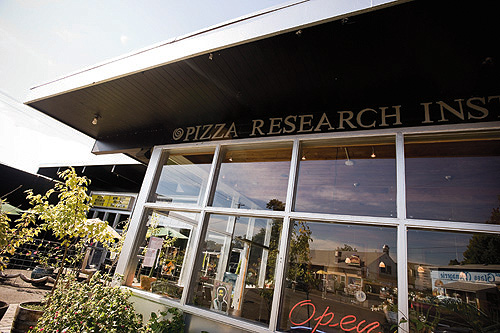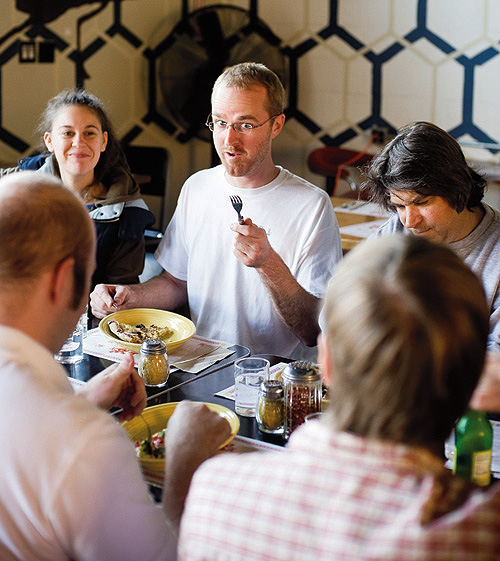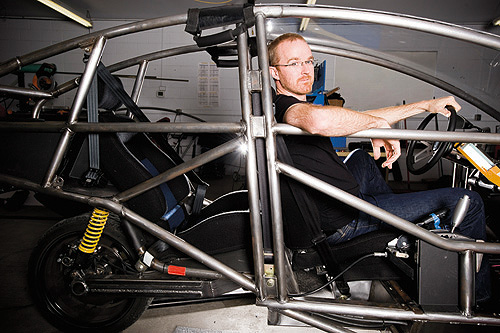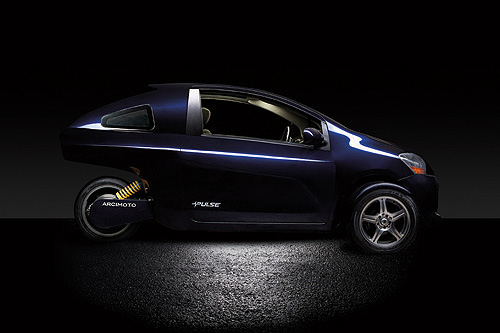 Mark Frohnmayer mixes pizza, yoga and electric cars to create a sustainable business — and life — in Eugene.
Mark Frohnmayer mixes pizza, yoga and electric cars to create a sustainable business — and life — in Eugene.
STORY BY KRISTEN HALL-GEISLER // PHOTOS BY LEAH NASH
 |
From inner peace to outer action: Eugene entrepreneur Mark Frohnmayer teaches yoga at Studio 508. |
Like so many others with coding skills in the late 1990s, Mark Frohnmayer started a video-game business. Unlike so many others, his start-up business, Garage Games, was more than a post-college whim — it’s still around, though without him at the helm. In 2007, Frohnmayer and his partners sold the business for quite a bit of cash. “I could’ve not worked for the rest of my days,” says Frohnmayer, now 36. Not that funding his lifestyle would take a fortune. “From a consumption point of view, I don’t demand a lot,” he says.
The next task was to decide what to do with his winnings, as he calls them, from the sale of his company. But while looking for his next project, the Eugene native felt a sense of despair at the mess the world was in. How could one man make a difference when the problems were so huge? He tried to tackle the question by taking a train trip to Washington D.C., to lobby against the wars in Iraq and Afghanistan. “You can see how well I did with that,” he says, laughing.
Frohnmayer, who is tall and lanky with short blond hair and wire-frame glasses, had already purchased a three-bedroom house that he still shares with roommates in Eugene’s Whiteaker neighborhood in 2005 and renovated it to be energy efficient. His philosophy of efficiency extended to his personal transportation. He searched for a fun electric vehicle that could get him around town at a reasonable price without the “I’m gonna die feeling” that so many neighborhood electric vehicles have. He came up empty.
Having degrees in electrical engineering and computer science from the University of California at Berkeley — and having been a General Motors scholar to boot — Frohnmayer decided to purchase a kit for a three-wheeled electric car called the BugE, which he built at home with friends. The kit car, which looks a bit like a white composite alien head on wheels, needed refinement to be viable for the mass market. But this, Frohnmayer recognized, was a way to make a dent in his despair.
In the meantime, a friend in real estate had bought a trio of buildings on the corner of Fifth Street and Blair Boulevard in the heart of Whiteaker and invited Frohnmayer to help with their redevelopment. “For a long time, I’d had a vision of a sort of a mixed-use development-style thing,” he says. “This opportunity presented a chance to take this empty carpet warehouse and junky office space and turn it into something cool.”
 |
 |
 |
Pizza Research Institute, with its vegan and vegetarian pizzas, helped Frohnmayer’s renovation project gain acceptance in Eugene’s Whiteaker neighborhood. |
From the need to fill this new space and a dream to make a difference was born Arcimoto, the electric car company that Frohnmayer started in October 2007 with two full-time employees. The company’s first electric vehicle, dubbed Version 1, is an adorable little open-topped delivery car in sunshine yellow. Not terribly practical in the Oregon winter (or spring or fall), but an attention-getter.
While being the son of Dave Frohnmayer, former University of Oregon president, has many advantages, it can be a disadvantage in an artsy, anarchist neighborhood like Whiteaker. Dave Frohnmayer acknowledges that his political baggage as a Republican candidate for governor in 1990 followed his son to some degree. Residents of Whiteaker were concerned that “a Frohnmayer” was coming in to raze buildings and gentrify their neighborhood, pushing out longtime residents. “But Mark is not ostentatious,” his father says, “and I admire him for that. He does his part by living it.”
Mark Frohnmayer took the concerns of his neighbors seriously and tried to solve problems, not create them. “I talked to lots of people about ideas and elements to bring in,” he says, especially around Whiteaker’s aesthetics and cultural values. He brought longtime Eugene fixture Pizza Research Institute (PRI), which had been serving creative vegetarian and vegan pizzas in town for two decades. (Frohnmayer himself is a vegetarian.) They moved a cleaned-out shipping container into the space to serve as a kitchen and invited local groups to hold fundraisers and informational events in the restaurant. PRI is also a stop on Eugene’s alternative Last Friday art walk.
“Mark is one of a handful of youngish entrepreneurs improving the neighborhood,” says PRI owner Will Boise. He was concerned that PRI might not be able to draw customers from outside the Whiteaker neighborhood, but that hasn’t been a problem in the year since the business moved. “Mark’s vision is to have this space be a model of urban revitalization,” Boise says, “and he’s been willing to go out on a limb with this project. It took a serious fiscal investment on his part.”
The restaurant shares a back patio with the “crack house,” as Frohnmayer calls it. Sliding glass doors lead from the PRI patio to what is now a cheery little house that Frohnmayer and his former redevelopment partner emptied and scrubbed. Frohnmayer then renovated it to serve as a wellness center and yoga studio where he and another instructor teach several yoga classes each week.
The final piece of the Blair Boulevard puzzle, where Frohnmayer is now the sole redeveloper, is the Arcimoto facility, where the electric-car prototypes are built in their entirety and the full-time staff has grown to eight. The front office houses desks for design, marketing and accounting staff; the back room is where the vehicles come to life. One wall of the glassed-in conference room serves as a showcase for potential Arcimoto vehicle designs.
It may seem counterintuitive to some to build a vehicle manufacturing business in a place like Eugene, but Frohnmayer would disagree. “It’s a national hub of motor-coach manufacturing,” he says. “We have a large potential workforce that’s already largely trained.” Three current Arcimoto employees bring their expertise from three wrecked RV companies from the area — Monaco, Country Coach and Marathon — to the electric-vehicle realm, and Frohnmayer would like to hire more experienced but displaced RV workers to build EVs when the cars are in regular production. (The first very small fleet of cars will be ready by the end of this year.) “If you have people in your back yard who are equipped to deal with tomorrow’s problems,” Frohnmayer says, “we shouldn’t outsource that expertise and that labor around the world.”
 |
Above: Frohnmayer in Arcimoto’s Version 4 car, which TV star Nathan Fillion calls “my spaceship.” Below: The Pulse was Arcimoto’s Version 3, a prototype focused on body fabrication. |
 |
Frohnmayer’s guiding principle is to think globally, act locally. “Looking at transportation, or green building, or energy efficiency, or whatever,” he says, “these are things that we can do anywhere, and we should probably do it everywhere rather than building a super-concentrated manufacturing operation.”
Keeping costs down means not reinventing the wheel — not even the parts that make the wheels turn. The company uses standard automotive parts for the bulk of the drive train. The current Arcimoto vehicle uses lead-acid batteries rather than the higher-tech, and far more expensive, lithium-ion batteries that cars like the Tesla Roadster use. Lead-acid batteries have been around for a century, they’re a proven technology, and they’re inexpensive. All of these aspects are a benefit for a startup company and a consumer wary of electric cars. It’s easy enough to upgrade the battery pack later, when the price comes down or the consumer needs more range.
Arcimoto uses parts that are already in mass production. “The high-volume, highly machined, highly tooled components are off the shelf,” says Frohnmayer. “Custom elements like the frame use low-cost, low-volume manufacturing.” So an interested EV startup in, say, Philadelphia is welcome to come to Eugene for a blueprint and training on how to build an Arcimoto vehicle on the East Coast and pay a royalty to Arcimoto for the privilege. “Rather than a company saying, ‘We’re going to go reinvent all that stuff,’ we can say, ‘Why don’t you just license all that undercarriage stuff from us and put the products out on the road that match your locale better?”’
Frohnmayer isn’t the only one thinking this way. Jay Rogers, CEO of Local Motors in Chandler, Ariz., founded his automotive startup in 2007 with the same idea of designing and building cars for a specific locale. In Local Motors’ case, the car is gasoline-powered and built by the buyer himself in what the company calls a microfactory. Rogers says of Frohnmayer: “Anybody who’s a vehicle pioneer, I applaud, because there is not one right answer.” Rogers could even see licensing Arcimoto’s underpinnings to answer a niche Local Motors might want to fill at one of its future microfactories.
There are lots of ways to work together in this new business sector, and Frohnmayer is open to new ideas. “It could simply be a preferred partnership arrangement where we’re sharing costs on the volume. We could add our volumes together when we’re sourcing and making orders.” A new coalition, Drive Oregon, was formed in 2009 by the Portland Development Commission in conjunction with Business Oregon, the state’s economic development agency. It brings together electric vehicle-related businesses in the state, including Arcimoto (Frohnmayer is on the steering committee), motorcycle manufacturer Brammo of Ashland and charger manufacturer Shorepower Technologies in Portland, to push the growth of the EV industry in Oregon.
Members of Drive Oregon are also working together to train the workforce needed for the technologies and compete as a unit for federal funding.
“The bulk of Arcimoto’s funding has come from me,” Frohnmayer says. “That funding stream has run its course. I’m basically totally out of cash.” Arcimoto has so far raised $2 million, and it recently won $30,000 in cash and in-kind services in the regional CleanTech Open competition. This prize puts it in line for the $250,000 national award.
Arcimoto has also used non-traditional sources coupled with star power to get a little extra cash. Nathan Fillion, star of ABC’s Castle and sci-fi cult favorite Firefly, went through the same process this past summer as Frohnmayer did in 2007. He, too, was looking for a fun electric vehicle to get him around Los Angeles without that “I’m gonna die” feeling when he found images of the Arcimoto Pulse, the company’s third prototype, online.
Fillion visited Arcimoto HQ in August and mentioned to Frohnmayer that actress Alyssa Milano had just raised several thousand dollars for charity through Twitter. Why not give it a try? Within a few days, Arcimoto had put up its Angel Wings donation page, and Fillion had pledged a $5,000 matching donation. “We’ve raised $13,000,” Frohnmayer says. “On average, people are donating $14.”
It reminds Frohnmayer of the despair he felt after exiting Garage Games. “This is a way that people can collectively say, ‘I can support an idea I believe in, and it’s a meaningful idea.”’
But it is an idea that will take some getting used to. People have been driving gasoline-powered cars for a hundred years. Electric cars have been around just as long, but 2011 is the year these alternative-fuel vehicles are poised for prime time. “What we’re seeing is the beginning of a brand-new market,” Frohnmayer says, one where the legacy of Eugene’s passion for sustainability can filter through a computer engineer with a vision to save the world.



